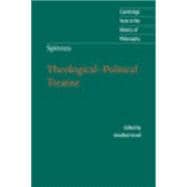
What is included with this book?
| Introduction | p. viii |
| Chronology | p. xxxv |
| Further reading | p. xxxviii |
| Note on the text and translation | p. xlii |
| Preface | p. 3 |
| On prophency | p. 13 |
| On the prophets | p. 27 |
| ON the vocation of the Hebrews, and whether the prophetic gift was peculiar to them | p. 43 |
| On the divine law | p. 57 |
| On the reason why ceremonies were instituted, and on belief in the historical narratives, i.e. for what reason and for whom such belief is necessary | p. 68 |
| On miracles | p. 81 |
| On the interpretation of Scripture | p. 97 |
| In which it is shown that the Pentateuch and the books of Joshua, Judges, Ruth, Samuel and Kings were not written by the persons after whom they are named. The question is then asked whether they were written by several authors or by one, and who they were | p. 118 |
| Further queries about the same books, namely, whether Ezra made a definitive version of them, and whether the marginal notes found in the Hebrew MSS are variant readings | p. 130 |
| Where the remaining books of the Old Testament are examined in the same manner as the earlier ones | p. 144 |
| Where it is asked whether the Apostles wrote their Epistles as apostles and prophets or as teachers, and the role of an Apostle is explained | p. 155 |
| On the true original text of the divine law, and why Holy Scripture is so called, and why it is called the word of God, and a demonstration that, in so far as it contains the word of God, it has come down to us uncorrupted | p. 163 |
| Where it is shown that the teachings of Scripture are very simple, and aim only to promote obedience, and tell us nothing about the divine nature beyond what men may emulate by a certain manner of life | p. 172 |
| What faith is, who the faithful are, the foundations of faith defined, and faith definitively distinguished from philosophy | p. 178 |
| Where it is shown that theology is not subordinate to reason nor reason to theology, and why it is we are persuaded of the authority of Holy Scripture | p. 186 |
| On the foundations of the state, on the natural and civil right of each person, and on the authority of sovereign powers | p. 195 |
| Where it is shown that no one can transfer all things to the sovereign power, and that it is not necessary to do so; on the character of the Hebrew state in the time of Moses, and in the period after his death before the appointment of the kings; on its excellence, and on the reasons why this divine state could perish, and why it could scarcely exist without sedition | p. 208 |
| Some political principles are inferred from the Hebrew state and its history | p. 230 |
| Where is shown that authority in sacred matters belongs wholly to the sovereign powers and that the external cult of religion must be consistent with the stability of the state if we wish to obey God rightly | p. 238 |
| Where it is shown that in a free state everyone is allowed to think what they wish and to say what they think | p. 250 |
| Annotations: Spinoza's supplementary notes to the Theological-Political Treatise | p. 260 |
| Index | p. 276 |
| Table of Contents provided by Ingram. All Rights Reserved. |
The New copy of this book will include any supplemental materials advertised. Please check the title of the book to determine if it should include any access cards, study guides, lab manuals, CDs, etc.
The Used, Rental and eBook copies of this book are not guaranteed to include any supplemental materials. Typically, only the book itself is included. This is true even if the title states it includes any access cards, study guides, lab manuals, CDs, etc.